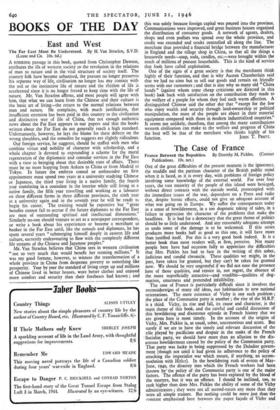BOOKS OF THE DAY
. East and West
The Far East Must Be Understood. By H. Van Straelen, S.V.D. (Luzac and Co. 10s. 6d.) A STRIKING passage in this book, quoted from Christopher Dawson, attributes the ills of western society to the revolution in the relations of man to nature and in the vital structure of society itself. The country folk have become urbanised, the peasant no longer preserves his separate way of life, civilisation no longer has any contact with the soil or the instinctive life of nature and the rhythm of life is accelerated since it is no longer forced to keep time with the life of nature. Mr. Van Straelen affirms, and most people will agree with him, that what we can learn from the Chinese and their culture is the basic art of living—the return to the normal relations between man and nature. He complains, with much justification, that insufficient attention has been paid in this country to the civilisation and distinctive way of life of China, that not enough authentic news about the Far East appears in our papers and that the books written about the Far East do not generally reach a high standard. Unfortunately, however, he lays the blame for these defects on the wrong shoulders, and the remedies he suggests are slightly ridiculous.
Our foreign service, he suggests, should be staffed with men who combine virtue and nobility of character with scholarship, and a whole chapter is devoted to expounding a scheme for the moral regeneration of the diplomatic and consular services in the Far East with a view to bringing about that desirable state of affairs. There must be no more hopping from Ankara to China or from Madrid to Tokyo. In future the embryo consul or ambassador on first appointment must spend two years at a university studying Chinese or Japanese, the third year living in a native family, the fourth year translating in a consulate in the interior while still living in a native family, the fifth year travelling and working as a labourer on three different farms in three different provinces, the sixth year at a university again and in the seventh year he will be ready to begin his career. The training would be expensive but " great benefits cannot fail to accrue if the future diplomats to the Far East are men of outstanding spiritual and intellectual dimensions." Similarly no-one should venture to act as a newspaper correspondent, or write a book about his experiences or become a merchant or banker in the Far East until, like the consuls and diplomats, he has spent several years " submerging himself deeply in eastern life and culture, earnestly endeavouring to flow with the completely different life streams of the Chinese and Japanese peoples."
Mr. Van Straelen believes that China sees in western civilisation " not so very much that would benefit her teeming millions." It was my good fortune, however, to witness the transformation of a whole province in China from desperate poverty to something like prosperity. Year by year the standard of living crept up and millions of Chinese lived in better houses, wore better clothes and enjoyed more comfort and security than their forebears had known ; and this was solely because foreign capital was poured into the province. Communications were improved, and great business houses organised the distribution of consumer goods. A network of agents, dealers, shops and even pedlars was spread over the whole province, and credit was extended and stocks controlled all along the line. The merchant thus provided a financial bridge between the manufacturer in England and the village shop in China, so that all the things a housewife needs—soap, soda, candles, etc.—were brought within the reach of millions of peasant households. This is the kind of service that fools have called exploitation.
One of the signs of a great society is that the merchants think highly of their function, and that is why Austen Chamberlain said that we had no aims but to sell our goods and remain on friendly terms with our customers ; and that is also why so many old "China hands " (against whom some cheap criticisms are directed in this book) look back with satisfaction on the contribution they made to the welfare of a people for whom they feel such warm affection. A distinguished Chinese said the other day that "except for the few who enjoy wealth and security through land-ownership or political manipulation, the mass of the people are abject in their material equipment compared with those in modern industrialised countries." It seems not unlikely, therefore, that among the many contributions western civilisation can make to the welfare and progress of China the best will be that of the merchant who thinks highly of his


























 Previous page
Previous page